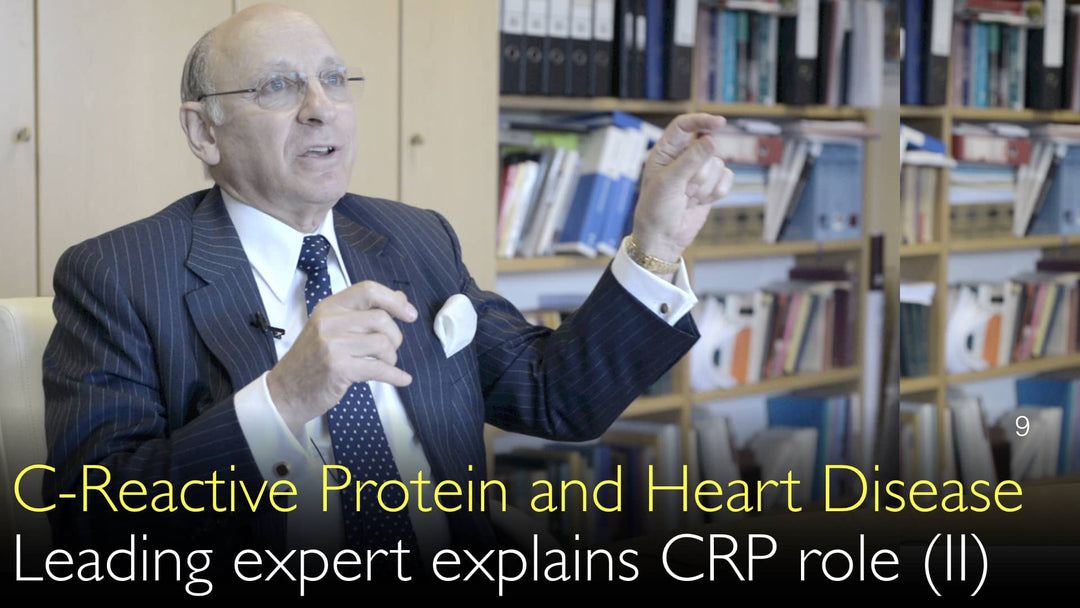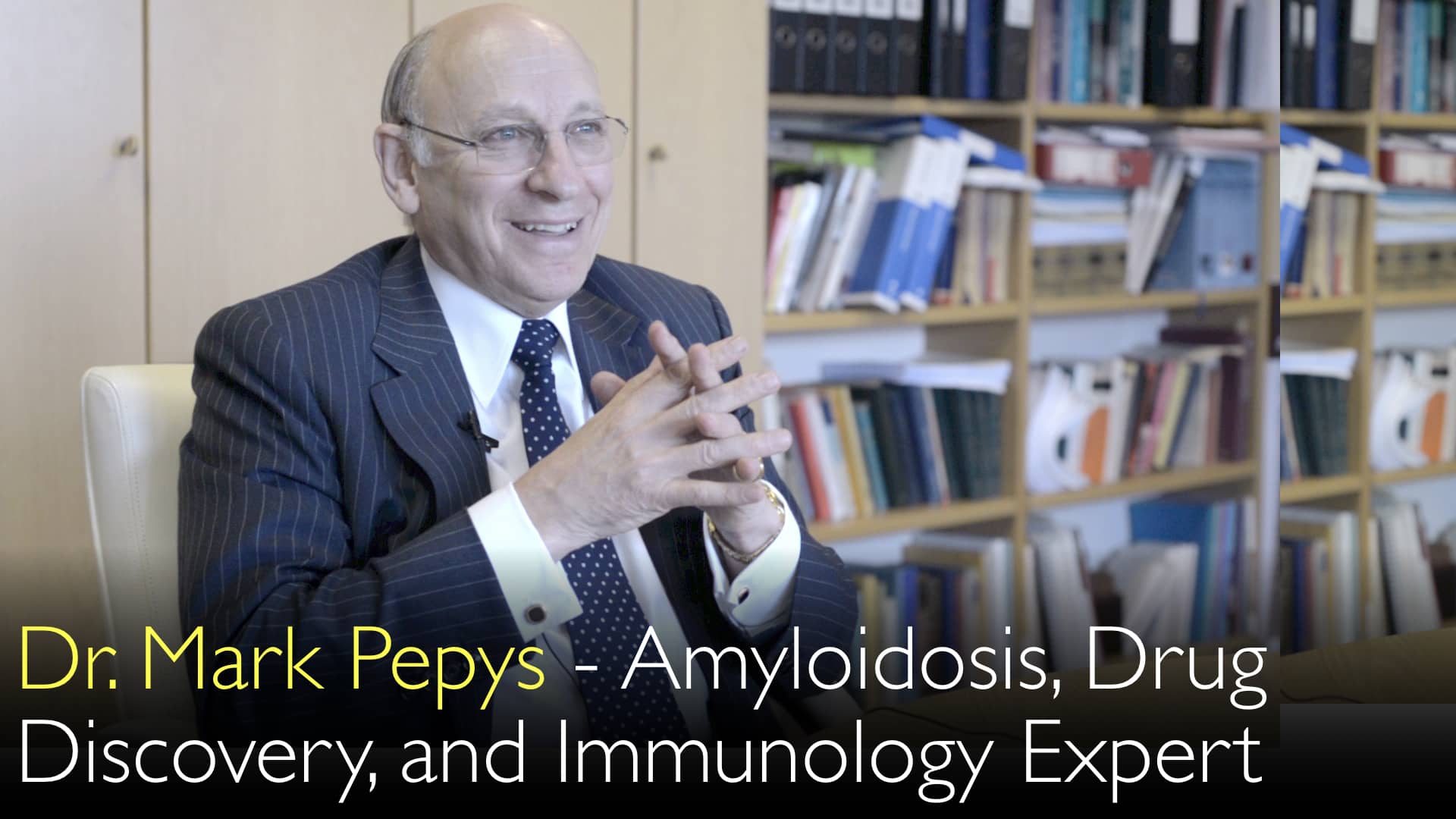מומחה מוביל באימונולוגיה ובחקר החלבון C-reactive, ד"ר מארק פפס, MD, מסביר את התפקיד האמיתי של CRP במחלות לב. הוא מבהיר כי CRP אינו גורם סיכון סיבתי לאירועים קרדיווסקולריים. ד"ר פפס מפרט כיצד מחקרים מוקדמים הוטעו על ידי חלבון לא טהור וערבבו בין קשר לסיבתיות. הוא חושף את הגילוי של צוותו כי CRP למעשה מחמיר נזק בזמן התקף לב או שבץ. ד"ר מארק פפס, MD, דן בפיתוח תרכובת טיפולית שנועדה לחסום CRP ולהפחית פגיעה לבבית.
הבנת חלבון C-Reactivi: סמן סיכון לעומת גורם במחלות לב
קפיצה לפרק
- CRP כסמן סיכון, לא כגורם
- ליקויים במחקר המוקדם על CRP
- ראיות גנטיות נגד סיבתיות
- התפקיד הביולוגי האמיתי של CRP
- CRP מחמיר נזק מהתקף לב
- פיתוח תרופות וכיווני טיפול
- תמליל מלא
CRP כסמן סיכון, לא כגורם
ד"ר מארק פפיס, MD, מבחין הבחנה קריטית בין סמן סיכון לגורם סיכון במחלות לב וכלי דם. גורם סיכון, כמו כולסטרול, תורם ישירות לתהליך המחלה. הורדת כולסטרול מגנה מפני טרשת עורקים. לעומת זאת, חלבון C-Reactivi הוא רק סמן סיכון בעל משמעות צנועה. ד"ר מארק פפיס, MD, מדגיש שהבחנה זו היא סוגיה מדעית רצינית, לא רק סמנטיקה. הבלבול בין קשר לסיבתיות הוביל לאי-הבנה רחבה לגבי תפקיד ה-CRP בבריאות הלב.
ליקויים במחקר המוקדם על CRP
ד"ר מארק פפיס, MD, מסביר כיצד מחקרים אפידמיולוגיים ראשוניים הניבו תוצאות מטעות. ניסויים אלה כללו אלפי אנשים אך מספר אירועי הלב בפועל היה קטן מאוד. זה איפשר אנומליות סטטיסטיות שהצביעו על קשר גבוה להפליא בין CRP בסיסי להתקפי לב עתידיים. כשהמחקר התרחב למאות אלפי משתתפים במטה-אנליזות, הקשר הוכח כחלש בהרבה. ד"ר מארק פפיס, MD, מציין שקשרים חלשים דומים נמצאים עם סמני דלקת אחרים כמו אלבומין נמוך או שקיעת דם (ESR), דבר המצביע על כך שאין דבר ספציפי ל-CRP.
בלבול נוסף נבע מניסויים in vitro פגומים. CRP שמקורו מסחרי היה לרוב לא טהור וזוהם בליפופוליסכריד חיידקי, חומר מעודד דלקת חזק. כשהחומר המזוהם הזה הוחל על תאים, הוא גרם לתגובה דלקתית חזקה. החוקרים ייחסו בטעות את האפקט הזה ל-CRP עצמו. ד"ר אנטון טיטוב, MD, דן בממצאים אלה עם ד"ר פפיס, שמדגיש את החשיבות של ריאגנטים טהורים במחקר רפואי.
ראיות גנטיות נגד סיבתיות
הראיה המוחלטת ביותר נגד היות CRP גורם למחלות לב מגיעה מאפידמיולוגיה גנטית, ספציפית רנדומיזציה מנדלית. ד"ר מארק פפיס, MD, מתאר כיצד גנים מסוימים שולטים ברמת ה-CRP הבסיסית של אדם. לאנשים מסוימים יש CRP נמוך טבעי של כ-0.1 מ"ג/ליטר, בעוד לאחרים יש רמה בסיסית של כ-5 מ"ג/ליטר. אם CRP היה גורם סיבתי, לאנשים עם גנים ל-CRP גבוה יותר הייתה שכיחות גבוהה משמעותית של מחלות לב וכלי דם. עם זאת, מחקרים גנטיים גדולים מראים שאין שום קשר בין הגנים השולטים ב-CRP לבין הסיכון להתקפי לב או שבץ. זה מהווה הוכחה חד-משמעית ש-CRP אינו גורם לאירועים קרדיווסקולריים.
התפקיד הביולוגי האמיתי של CRP
ד"ר מארק פפיס, MD, מבהיר את התפקוד הביולוגי האמיתי של חלבון C-Reactivi. CRP הוא חלבון קשירה, הקשור קשר הדוק ל-SAP (רכיב עמילואיד P בסרום). הוא מזהה וקושר שאריות פוספוכולין החשופות על ממברנות של תאים מתים או פגומים. קשירה זו מפעילה את מערכת המשלים, חלק ממערכת החיסון האחראית לסילוק פסולת תאית ופתוגנים. בתפקיד זה, CRP פועל כנשא מועיל, מסייע לגוף בניקוי לאחר פציעה או מוות תאי. תהליך זה הוא חלק טבעי ממנגנוני ההגנה והתיקון של הגוף.
CRP מחמיר נזק מהתקף לב
למרות תפקידו המועיל בסילוק פסולת, ד"ר מארק פפיס, MD, וצוותו גילו תגלית מכרעת ב-1999. בהקשר של אירוע חריף כמו התקף לב, פעילות ה-CRP הופכת מזיקה. במהלך אוטם שריר הלב, עורק כלילי חסום גורם למות תאי שריר הלב מחוסר חמצן. CRP נקשר לתאים הגוססים ומפעיל את מערכת המשלים. הפעלה זו מגבירה משמעותית את התגובה הדלקתית, מגדילה מאוד את גודל האוטם ואת הנזק הנובע. צוותו של ד"ר פפיס אימת מנגנון זה במודלים בבעלי חיים, והראה שהזלפת CRP אנושי לחולדות עם התקפי לב מושרים החמירה מאוד את הנזק באופן תלוי משלים.
פיתוח תרופות וכיווני טיפול
תגלית זו אימתה את CRP כמטרה טיפולית מבטיחה למצבים חריפים. ד"ר מארק פפיס, MD, מסביר שצוותו יצא לפתח תרופה שתחסום את קשירת CRP לתאים פגומים. המטרה הייתה להפחית את הנזק התלוי משלים במהלך התקף לב או שבץ. הם יצרו בהצלחה משפחה של תרכובות מועמדות שפעלו ביעילות רבה במודלים בבעלי חיים. תרופות אלה תוכננו להזלפה תוך-ורידית, מה שהפך אותן מתאימות לחולים מאושפזים החווים אירועים חריפים.
עם זאת, הדרך לפיתוח תרופות קשה notoriously. ד"ר אנטון טיטוב, MD, וד"ר פפיס דנים באתגרים העצומים. התרכובות הראשונות היו קשות מאוד לטיהור בקנה המידה הגדול הנדרש לייצור תרופות. זה עצר את פיתוחן. ד"ר מארק פפיס, MD, מציין שצוותו נמצא כעת עמוק בתהליך של ניסיון להמציא מולקולות חדשות, ניתנות יותר לפיתוח, שיכולות להשיג את אותו אפקט טיפולי - חסימת CRP להגבלת נזק רקמתי - אך ניתן לייצרן כתרופות יציבות ויעילות מבחינה כלכלית.
תמליל מלא
ד"ר אנטון טיטוב, MD: האם CRP [חלבון C-Reactivi] הוא "גורם סיכון" למחלות לב?
ד"ר מארק פפיס, MD: חלבון C-Reactivi הוא אכן סמן סיכון צנוע מאוד למחלות לב וכלי דם. אבל הסיפור הזה הוגזם מאוד. אנשים התחילו לדבר על CRP כ"גורם סיכון". "גורם סיכון" הוא משהו שתורם בפועל למחלה. כולסטרול הוא גורם סיכון. אנחנו יודעים שכולסטרול גורם לטרשת עורקים. אם יש לך יותר מדי כולסטרול, אתה מפתח טרשת עורקים. אם אתה מוריד כולסטרול, אתה מגן מפני טרשת עורקים.
שוב, משחקים במילים! זה לא רק משחק במילים. זו גם טעות מדעית רצינית: הבלבול בין קשר לסיבתיות. אנשים עשו ניסויים קליניים אפידמיולוגיים שנראו גדולים כי היו מעורבים בהם אלפי אנשים. אבל מספר האירועים, מספר התקפי הלב בהם, למשל, היה קטן מאוד.
עכשיו, לא משנה אם יש לך 10,000 אנשים בניסוי קליני. אם יש לך רק מאה התקפי לב בניסוי קליני, אתה יכול לחלק אותם לחמישיות לפי מה שה-CRP שלהם היה לפני שנה או 10 שנים. אתה יכול לקבל כל מיני תוצאות מוזרות.
התוצאות האפידמיולוגיות המקוריות הצביעו על קשר פנטסטי, מדהים, לא ייאמן בין CRP בסיסי מוגבר לסיכון של המטופל לקבל התקף לב מאוחר יותר. אבל אז האפידמיולוגיה עלתה לקנה מידה אפידמיולוגי ראוי. מאות אלפי אנשים נבדקו. נעשו מטה-אנליזות או ניסויים קליניים גדולים מאוד על חלבון C-Reactivi והתקפי לב. התברר שהקשר היה הרבה, הרבה חלש יותר. הוא עדיין שם, אבל הוא די צנוע.
כל מה שזה באמת אומר זה לא הרבה. אתה מוצא את אותו הקשר עם סמני דלקת רבים אחרים. זה לא משהו ספציפי ל-CRP. אתה מוצא קשר נמוך עם אלבומין נמוך; כשהערך CRP עולה, אלבומין יורד. שקיעת דם (ESR), או הציטוקינים, כל מיני דברים כאלה.
אז זה היה בלבול מוחלט, בלבול שגוי בין קשר לסיבתיות. זה החמיר כי אנשים עשו ניסויים in vitro עם CRP ממקור מסחרי. חלבון C-Reactivi היה לא טהור. הוא היה מזוהם בליפופוליסכריד חיידקי, שהוא מאוד מעודד דלקת. הם שמו את זה על תאים והתאים הגיבו "וואו!". החוקרים אמרו "זה ה-CRP שגורם לטרשת עורקים!".
הם אפילו עשו ניסויים in vivo שבהם הזריקו את החומר המלוכלך הזה לאנשים. הם קיבלו הרבה דלקת. לגוף יש תגובה חזקה לפוליסכרידים חיידקיים. כן, נטען ש-CRP הוא מעודד דלקת. התברר שחלבון C-Reactivi אינו מעודד דלקת.
בסופו של דבר היינו מאוד מודאגים מדיווחים אלה. לא הצלחנו לשחזר אותם in vitro או במודלים בבעלי חיים. ייצרנו CRP אנושי בדרגה פרמצבטית מדם תורמים אנושיים. זה היה תהליך מאוד מייגע, מאוד יקר. הזלפנו חלבון C-Reactivi למתנדבים בריאים. נחשו מה קרה להם? כלום לחלוטין!
הראינו ש-CRP אינו מעודד דלקת אם אתה בריא. כל הסיפור של CRP כסמן סיכון לטרשת עורקים ולסיכון קרדיווסקולרי הוא שקרי. זה התאדה.
המסמר האחרון בארון היה מה שנקרא "אפידמיולוגיה גנטית" או רנדומיזציה מנדלית. לפעמים אתה מוצא את הגנים שמקודדים רמות שונות של חלבון C-Reactivi [CRP] בבסיס או תגובות חריפות שונות. יש גנים כאלה. יש פולימורפיזמים שונים באוכלוסייה האנושית. לאנשים מסוימים יש גנים שנותנים להם CRP בסיסי נמוך, 0.1 מ"ג לליטר. אנשים אחרים מסתובבים עם CRP בסיסי של 5 מ"ג לליטר. לפעמים יש להם תגובה חריפה; בהתאם, האחד עולה יותר מהאחר.
עכשיו דמיינו ש-CRP גרם למחלות לב וכלי דם. אז לאנשים שיש להם את הגנים המקודדים ליותר CRP הייתה יותר מחלה קרדיווסקולרית. לאנשים עם רמות נמוכות יותר של חלבון C-Reactivi הייתה פחות מחלה קרדיווסקולרית. מתברר שאין שום קשר בין חלבון C-Reactivi למחלות לב. גנים השולטים בייצור CRP והאם אתה מקבל התקפי לב או שבץ - אין שום קשר. "לא" לחלוטין.
לא משנה מה אנשים מצאו בניסויים in vitro. הם יכולים להתווכח על ניסויים, הזלפות וכו'. זה חד-משמעי ש-CRP אינו גורם להתקפי לב ושבץ.
זה צד אחד של הסיפור. הצד השני של הסיפור הוא ש-CRP הוא חלבון קשירה. CRP למעשה קשור מאוד ל-SAP, שדיברנו עליו בהקשר לעמילואידוזיס. SAP נקשר לסיבי עמילואיד. למה CRP נקשר? CRP נקשר לתאים מתים או פגומים. הוא מזהה שאריות פוספוכולין.
שאריות כימיות אלה נמצאות בכל מקום בממברנות פלזמה, בפוספוליפידים. שאריות אלה נחשפות כשתאים חולים, גוססים או מתים. CRP נקשר לתאים מתים וגוססים. CRP אנושי גם מפעיל מערכת חלבונים בדם הנקראת מערכת המשלים. זו מערכת מעודדת דלקת והגנה של המאכסן. הגוף משתמש בה כדי להיפטר מחיידקים ולפנות פסולת.
אנחנו משתמשים בה בטיפול העמילואיד שלנו כדי להיפטר ממשקעי עמילואיד. הנוגדן מפעיל משלים; זה מה שמסיר משקעי עמילואיד. הגוף משתמש ב-CRP כדי להיקשר לתאים מתים כדי להפעיל משלים. זה עוזר להיפטר מתאים מתים.
אבל אנחנו הראינו קודם כל ב-1999 - אנשים רבים "רמזו" על זה, עשו "תצפיות", "הציעו את זה" - עשינו את הניסויים המוחלטים הראשונים. הראינו ש-CRP למעשה מחמיר את הנזק בהתקף לב ממה שהיה אחרת.
בזמן התקף לב העורק הכלילי שלך נחסם. אין זרימת דם עורקית לחלק מהשריר הלבבי. התאים מתים מחוסר חמצן. נתח משריר הלב שלך מת. אם תכניס CRP אנושי לניסוי כזה בחולדות, CRP אנושי מפעיל את מערכת המשלים של החולדה. אתה מגדיל מאוד את גודל האוטם. זה תלוי-משלים. אנחנו יודעים את המנגנון; הראינו את כל המולקולות שם.
ד"ר אנטון טיטוב, MD: זו האימות של CRP כמטרה טיפולית.
ד"ר מארק פפיס, MD: כי אתה יכול להסתכל על כל מי שמת מהתקף לב. אתה תמיד יכול למצוא CRP ומשלים בתוך האוטם ומסביבו. השריר המת נמצא שם. חלבון C-Reactivo (CRP) תמיד נמצא שם. אלה המולקולות שהופכות את המצב לגרוע יותר. יצאנו לדרך כדי ליצור תרופה שתמנע את קשירת ה-CRP שם.
הראינו את אותו דבר במודל חולדות לשבץ. אנחנו יכולים להגדיל את השבץ בחולדות על ידי הוספת CRP אנושי. יצאנו לדרך כדי ליצור מולקולות שיחסמו את קשירת ה-CRP לתאים מתים ופגומים. תרופות כאלה יכולות להפחית את הנזק בהתקף לב. יצרנו מולעמד מוצלח ומשפחה של תרכובות.
ד"ר אנטון טיטוב, MD: זה למעשה במודל החיה עבד מאוד, מאוד טוב.
ד"ר מארק פפיס, MD: אבל הן התבררו כלא ניתנות לפיתוח כתרופות, לפחות עד כה. דיברנו קודם על המסע הסיוטי של פיתוח תרופות. זה באמת מסע סיוטי. אין דבר שהאנושות עושה שהוא כל כך קשה, כל כך איטי וכל כך יקר כמו לנסות לפתח תרופה חדשה. זה יכול לקחת עשורים ולעלות מיליארדי לירות. אז זה מסע סיוטי בלתי ניתן לתיאור.
המולקולות הספציפיות האלה נראו מאוד מבטיחות לפחות לשימוש כתרופות לעירוי. הן לא יכלו להילקח דרך הפה אבל יכלו להיות מוזלפות לווריד. זה בסדר אם יש לך מטופל בבית חולים עם התקף לב, או שבץ, או כוויה, למשל, где CRP גם תורם לנזק, או טראומה, ודברים אחרים. אבל היה מאוד קשה לטהר אותן בקנה מידה שיהיה necessary לפיתוח תרופות.
ד"ר אנטון טיטוב, MD: המולקולות האלה הפסיקו פיתוח.
ד"ר מארק פפיס, MD: אנחנו כרגע מנסים, בקשיים ניכרים, להמציא מולקולות אחרות שיעשו את אותו דבר. אלה יהיו מוצקים נחמדים שניתן לייצר בכמויות גדולות במחיר קביל. אנחנו עמוק בתוך מעמקי פיתוח התרופות האלה. אולי מישהו ירצה לבוא ולתת לנו כמה מיליוני לירות כדי לעזור למסע הזה להמשיך. זה יתקבל בתודה רבה!





